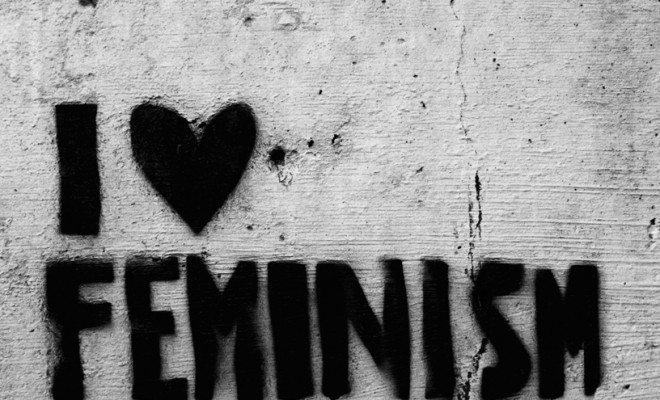 Image courtesy of [Jay Morrison via Flickr]
Image courtesy of [Jay Morrison via Flickr]
Society and Culture
2015’s Best Feminist Moments
Feminism fights for political, social and economic equality for every gender, and this year we saw several amazing examples of that fight. It was a year of struggle, but if feminists in 2015 have proven anything, it’s that we will always push back against anything–or anyone–who tries to bar any group of people from their basic human rights. Here are just a few of my favorite feminist moments from 2015.
1. Celebrities stand up for equal pay.

Image courtesy of [Disney/ABC Television Group/Craig Sjodin via Flickr]
Back in February, the Oscar winner for Best Supporting Actress, Patricia Arquette, took her opportunity on stage to deliver a powerful message about the wage gap:
To every woman who gave birth to every taxpayer and citizen of this nation we have fought for everybody’s equal rights. It is our time to have wage equality once and for all and equal rights for women in the United States of America.
While her comments after she left the stage have been called into question, her main point is clear: the wage gap exists and it’s time we acknowledge and fix it.
Then, in October, Jennifer Lawrence called Hollywood out on the fact that she earned less than her male co-stars, and realized her own insecurity with asking for what she deserved:
I didn’t want to seem ‘difficult’ or ‘spoiled.’ At the time, that seemed like a fine idea, until I saw the payroll on the Internet and realized every man I was working with definitely didn’t worry about being ‘difficult’ or ‘spoiled.’
Her fear of being judged for her confidence is something many women struggle with. It is high time we stop apologizing for demanding equality.

2. Feminist Democrats announce their candidacies for President.
It came as no surprise when Hillary Clinton submitted her name for the presidential ballot. Needless to say, America’s first female president would have the potential to move the country rapidly towards true gender equality. If fellow female candidate, Republican Carly Fiorina, had proven herself to be a champion for equal rights, I’d be cheering her on, too. Unfortunately, she has demonstrated that not every woman believes in feminist ideals.
And let’s not forget that men can be feminists as well. Martin O’Malley, the Democratic Governor of Maryland, has fought for not only women’s rights, but equal rights for people of all genders and sexual orientation.
Welcome to MD @MittRomney. FYI, in our State we don’t try to take away women’s health services. We work to expand them.
— Martin O’Malley (@MartinOMalley) March 21, 2012
Hillary’s main competition for the Democratic bid, Senator Bernie Sanders, was asked by the Washington Post if he is a feminist, to which he replied, “Yes.” His long political career certainly shows that:
In terms of women’s rights, you’re looking at somebody who, to the best of my knowledge, has a 100 percent pro-choice voting record. You’re looking at somebody who’s made a cornerstone, a key part of my campaign, the need for at least three months of family and medical leave; somebody who is fighting to raise the minimum wage over a two year period to $15 an hour, which will benefit everybody, but women actually more than men; somebody who regards it as enormously important that we fight for pay equity for women…So I think if people look at my record, I think they will see somebody who has had a lifelong record of support for the women’s movement and women’s rights.
So whoever becomes the Democratic candidate for POTUS, equal rights will certainly be at the forefront of their platform, and that is truly exciting.
3. “‘Playing like a girl’ means you’re a badass.”
The women of the United States national soccer team took on the Japanese in July for the final game of the FIFA World Cup–and they won. It was the most-watched, televised soccer game ever, male or female, in the history of the U.S.
While honoring the team a few months later, President Obama sang their praises, saying, “This team taught all of America’s children that ‘playing like a girl’ means you’re a badass.”

And of course, he’s right. Now, if only those female athletes would get the same pay as their male counterparts.
4. Same-sex marriage is legalized in all 50 states.
June was a historic month for marriage equality, when the Supreme Court declared same-sex marriage legal in all 50 states. Despite push back from people like the county clerk who refused to issue same-sex marriage licenses, justice prevailed and now people of any gender can marry whoever they want to.

5. “I stand with Planned Parenthood.”

Image courtesy of Charlotte Cooper via Flickr
The battle to keep federal funding for Planned Parenthood has been raging for months, with men and women alike fighting tooth and nail to prove that the medical institution is more than just abortions. Thanks to a slanderous smear campaign of doctored videos earlier in the year, Planned Parenthood’s use of funding and ethical practices were called into question. That campaign was later proved to be based on false claims, and Planned Parenthood president Cecile Richards valiantly took on the opposition in a brilliant testimony, but the damage had already been done. House Republicans have attempted numerous times to strip Planned Parenthood of its federal support, which would surely cripple the organization that has helped millions of men and women with reproductive and basic health services. Planned Parenthood supporters took to the streets and to social media to show their support, with rallies, parades and campaigns like #ShoutYourAbortion. The outpouring of people standing behind Planned Parenthood proves that the Republican-controlled Congress does not have the interests of most Americans at heart, and brings the issue of reproductive rights to the forefront.
6. Study proves men and women are wired the same.
In a study published in November in the journal Proceedings of the National Academy of Sciences (PNAS), researchers have proven that there is no difference between the brains of men and women:
Our study demonstrates that, although there are sex/gender differences in the brain, human brains do not belong to one of two distinct categories: male brain/female brain.

They found that, while some characteristics are more common in one gender over the other, those characteristics are not exclusive to one gender, and the brain is made up of complex “mosaics.” Despite an age-old belief, the human brain cannot be classified based on gender. Men and women have the same brains.
7. The U.S. Military opens all combat roles to women.
In August, women everywhere cheered on the success of the first two female soldiers to complete the Army’s elite ranger school. They proved that, at least some women, can handle the same physical and mental challenges that men have been dealing with as rangers for decades. However, unlike the male graduates, the female soldiers could not apply for combat roles in the 75th Ranger Regiment.
That changed in early December, when Defense Secretary Carter made the historic announcement that all roles in all military branches will now be open to women.
The announcement was not met with support across the board, by some in both the civilian population and by some already in the armed forces. Many called into question the physical abilities of females, pointing out that women are held to a lower physical fitness standard, and even going so far as to allege that females in certain combat positions would serve as distractions to their male colleagues.
These arguments are absolutely reflective of the inherent misogyny in American society and the gender stereotypes to which many still cling to. Of course, standards should not be lowered to let women into special forces. Let all the men and women going for those roles succeed or fail based on skill. If men cannot control themselves around female counterparts, that is their fault, not the fault of women.
The pushback is unfortunate, but the opposition will not change the course of the announcement. Despite requests for some positions in the Navy and Marines to still remain closed to females, if women meet the standards set to obtain those roles, they will be able to serve in them. It will not be easy, but women have proven time and again that we can overcome adversity and oppression.
Whether it’s fighting for your country, serving as a politician, acting in Hollywood, playing on professional sports teams, or even raising a family, 2015 has proven that anyone of any gender can do anything.








Comments